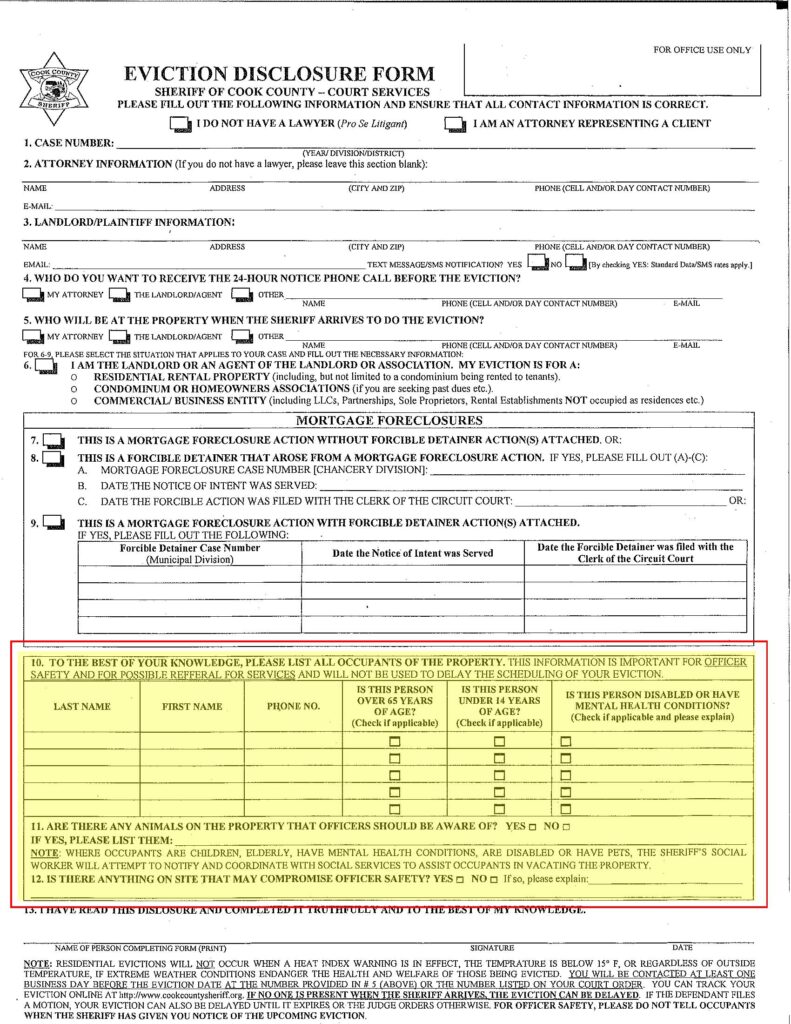 Columnist conveniently ignores fact that eviction system needs reform
Columnist conveniently ignores fact that eviction system needs reform
Chicago Sun Times columnist Mark Brown is at it again. He’s written another column calling out State Representative Monique Davis for her (third, revised) attempt to reform our broken Cook County eviction system.
Rep. Davis has amended her proposed eviction reform legislation a third time, this time allowing for the possibility that an entity other than the Cook County Sheriff could enforce eviction orders. Rather than applauding this revised effort, Mr. Brown has decided to take pot shots and jabs at Rep. Davis, who, it seems to me, he does not particularly like.
As such, Mr. Brown opposes this proposal. He argues that the Cook County Sheriff has a particular specialty in enforcing evictions because of the kind and compassionate procedures adopted by the Sheriff’s office. He sets up a straw-man argument by pointing to a few “hard luck” stories with a happy ending to bolster his case. Mr. brown points to a social worker, Kathryn Pieri, who works in the Cook County Sheriff’s eviction enforcement department and indicates that she could show Rep. Davis a thing or two about the tenants that the Cook County Sheriff’s Office has helped when they were being evicted. He cites a number of examples of the Sheriff working to help evicted occupants. He goes on to say that the social worker “could tell [Davis] stories of temporarily delaying scheduled evictions while she worked with desperate tenants to avoid allowing the eviction to result in homelessness or worse.”
Wait, WHAT???? TEMPORARILY DELAYING EVICTIONS????
It already takes the Sheriff’s office about eight weeks to get out to evict a tenant. They delay them longer? Mr. Brown’s points out that the “sheriff is four to five weeks behind in carrying out eviction orders at present”. (That is an interesting time estimate and is not currently consistent with my own experience, but hey, who’s to fight over a few weeks, right?) Nonetheless, it still takes too long. Eight weeks is too long. Six weeks is too long. Four weeks is too long.
Let me digress for just a moment to make a quick point about the concept of delaying evictions. Most experienced landlords know that the Cook County Sheriff’s Department requires landlords to fill out an information sheet when they place an order for possession for enforcement. That sheet demands that the landlord produce a good deal of information, including, among other things, information about the names, ages, and health conditions of the occupants being evicted. Take a look at a copy of item #10 of the form just below at item #10. It specifically says there that “THIS INFORMATION IS IMPORTANT FOR OFFICER SAFETY AND FOR POSSIBLE REFERRALS FOR SERVICES AND WILL NOT BE USED TO DELAY THE SCHEDULING OF YOUR EVICTION.”
 So, it seems that the Sheriff’s statement about not delaying an eviction is not true and that this has now been confirmed by a member of the Sheriff’s department. In fact, Brown writes about a scheduled eviction where “Sheriff’s deputies decided they could put off that eviction a bit longer while Pieri hunts for a new apartment [for the tenant]”. Brown goes on to write “Pieri says that sort of thing happens two or three times every week”. Unbelievable.
So, it seems that the Sheriff’s statement about not delaying an eviction is not true and that this has now been confirmed by a member of the Sheriff’s department. In fact, Brown writes about a scheduled eviction where “Sheriff’s deputies decided they could put off that eviction a bit longer while Pieri hunts for a new apartment [for the tenant]”. Brown goes on to write “Pieri says that sort of thing happens two or three times every week”. Unbelievable.
If you are a landlord, I am assuming your head is exploding. Who the heck is paying for that “extra time”? The Deputies decided to put the eviction off? That is compassion? That is insane.
The fact of the matter is that it is not the Sheriff’s job to be compassionate. It is the Sheriff’s job to enforce duly entered orders for possession and to keep the peace while doing so. Do the Sheriff’s officers who do this job do it well? Absolutely. Should this other “stuff” get in the way? Absolutely not.
Anyone who reads this blog knows I am not in favor of tenants getting steamrolled. They know that I am a firm proponent of landlords following the rules. However, I just can not get behind the concept of the Sheriff delaying evictions.
If an eviction should be stayed or slowed, that is within the control of the Judge, not the Sheriff. Mr. Brown does not agree. He says “This is the world of eviction, which indeed is inhabited in part by the deadbeats that Davis describes but also by people with real-life complications that may have never made it to the attention of an Eviction Court Judge”. Why is that? I’ve never seen an eviction court judge stop a tenant from explaining their situation to the court. Could it be that these folks who are being evicted did not speak up? Could it be that they did not show up? Cook County Judges routinely offer a one to two week stay period so that they tenant can get out (they almost never do) before an order can even be brought to the Sheriff to get in line for enforcement. I’ve spent plenty of time on the thirteenth and fourteenth floor of the Daley center. I have seen the judges there act with compassion and consideration in making their rulings. Tenants can request a longer stay period. Tenants can suggest to the court the reasons they may need some extra time. It is up to the judge, not the Sheriff, to determine that time.
Finally, Mr. Brown indicates that he accompanied a Sheriff’s officers as they “served eviction notices on South Side residents, the first step in a process that month’s later could result in somebody’s forcible removal.” Hmmm… I did notice on the Sheriff’s website that he recently performed “postings” in foreclosure eviction cases. Those foreclosure evictions are quite different than an ordinary tenant eviction. I don’t know but do suspect that Mr. Brown doesn’t know the distinction. It also seems, as he makes plainly clear, that he doesn’t really understand the problem.
Hey, we all want to be “good guys”. Who would not want to “help people”? No one wants anyone thrown out on the street. However, unless I am mistaken, despite the sincere wishes of many tenant’s rights groups, housing is not a human right. Landlords need to be paid. When they are not paid, they go into foreclosure themselves. When the Sheriff delays doing his job so that he can “do good”, he is passing on the cost of his actions to the landlord. Then, the landlord goes into foreclosure. Then, all the tenants in the building might get evicted. See how that works?
